Revitup.Direct Blog
Exploring the Future of Travel: Insights from Google and Deloitte

By 2040, global travel will undergo dramatic transformations, reshaping how we explore the world. A collaborative study by Google and Deloitte offers fascinating predictions about these shifts, driven by technological advancements, evolving consumer behaviors, and emerging markets. This research not only highlights expected growth in travel but also the fundamental changes in travelers' preferences and the industry’s response to meet them.
About the Research
This research conducted by Deloitte and Google, in collaboration with various tourism experts, utilizes a robust methodology to predict future tourism flows. The study analyzed over 90,000 data points from trusted sources like the UNWTO, incorporating multi-billion Google search queries to understand travel planning behavior across 230 countries. Using predictive models such as XGBoost for arrivals and linear models for departures, the analysis focused on approximately 20 key variables to forecast tourism trends. This comprehensive approach aims to help travel operators and distributors anticipate and adapt to future shifts in the industry.
The Expanding Global Travel Landscape
The report projects a 60% surge in international travel, climbing from 1.5 billion trips annually today to approximately 2.4 billion by 2040. This growth is fueled by an expanding middle class in emerging markets and increased accessibility through enhanced connectivity and infrastructure. Nations like India and Indonesia are expected to play a significant role in this boom, contributing a substantial number of first-time international travelers.
Key regions like the Middle East, notably Saudi Arabia and the UAE, are anticipated to see rapid growth. Meanwhile, established tourist destinations such as Spain and Mexico are projected to maintain their popularity but will face heightened competition from these emerging markets.
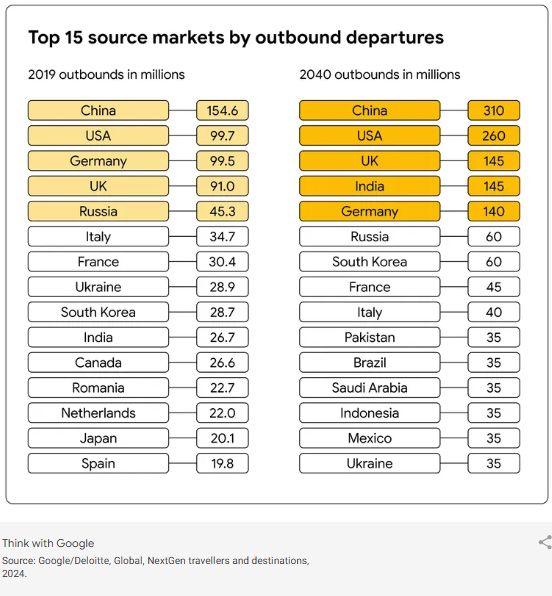
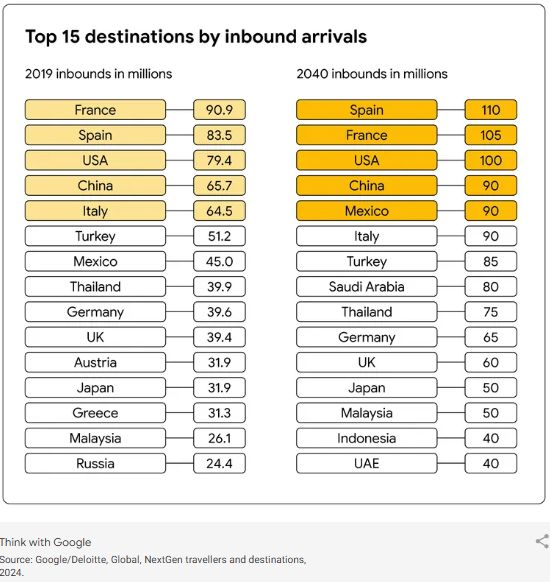
Source: Google/Deloitte, Global, NextGen travellers and destinations, 2024.
Four Distinct Travel Patterns
The study identifies four distinct travel patterns based on sociodemographic and behavioral traits:
- Newcomers: Emerging markets (e.g., Russia, Japan, Turkey), prefer short-haul destinations, showing rapid market growth.
- Amateurs: Moderate growth, likely progressing toward frequent, long-haul travel over time.
- Experienced Travelers: Stable markets, moderate spending, and diversified destination choices.
- Super-Experienced: High-spending travelers favoring long-haul destinations in mature markets.
Behavioral Insights: Income, age, and spending habits influence these categories. Booking habits vary, with some preferring intermediaries and others adopting online-centric approaches.
The New Traveler: Evolving Preferences
Future travelers will be informed, value-driven, and tech-savvy, seeking experiences reflecting individuality and culture. Personalization is key, as travelers expect tailored recommendations. Sustainability is also a cornerstone, with eco-conscious choices influencing preferences for low-impact transportation, sustainable accommodations, and eco-tourism initiatives.
Technological Transformations will enhance planning and experiences:
- Real-time translation tools, augmented reality, and advanced booking platforms simplify and enrich journeys.
- Hyper-personalized AI platforms will cater to niche interests by optimizing itineraries and destination suggestions.
- Virtual and augmented reality tools will enable immersive previews, reducing uncertainty and enhancing satisfaction.
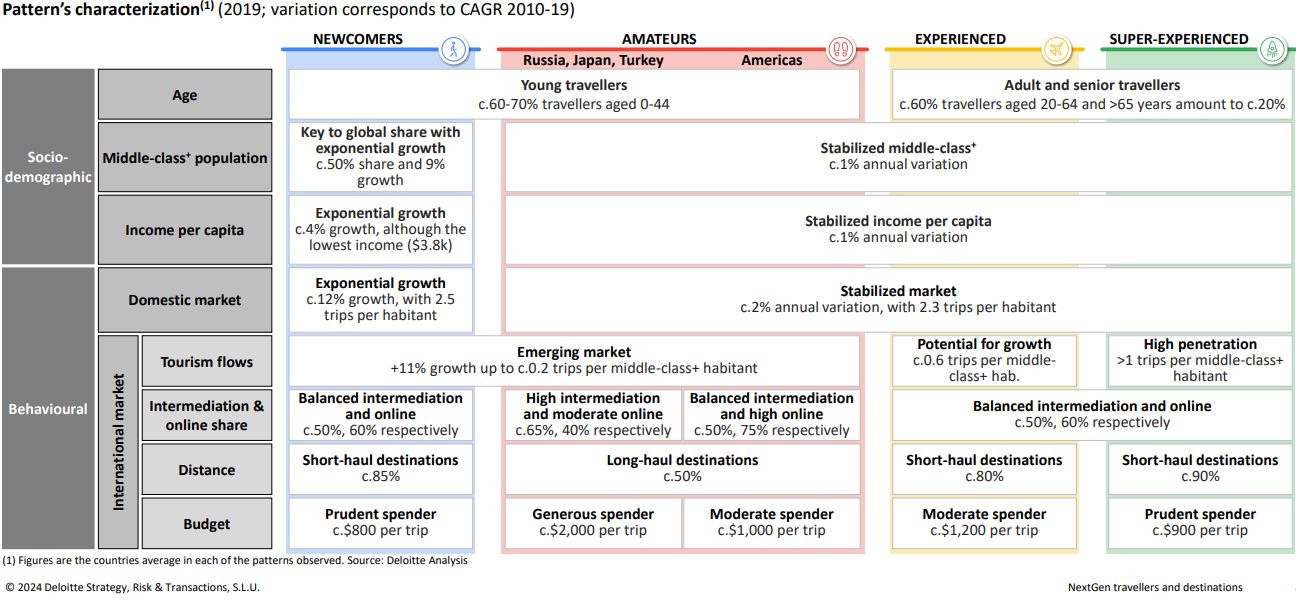
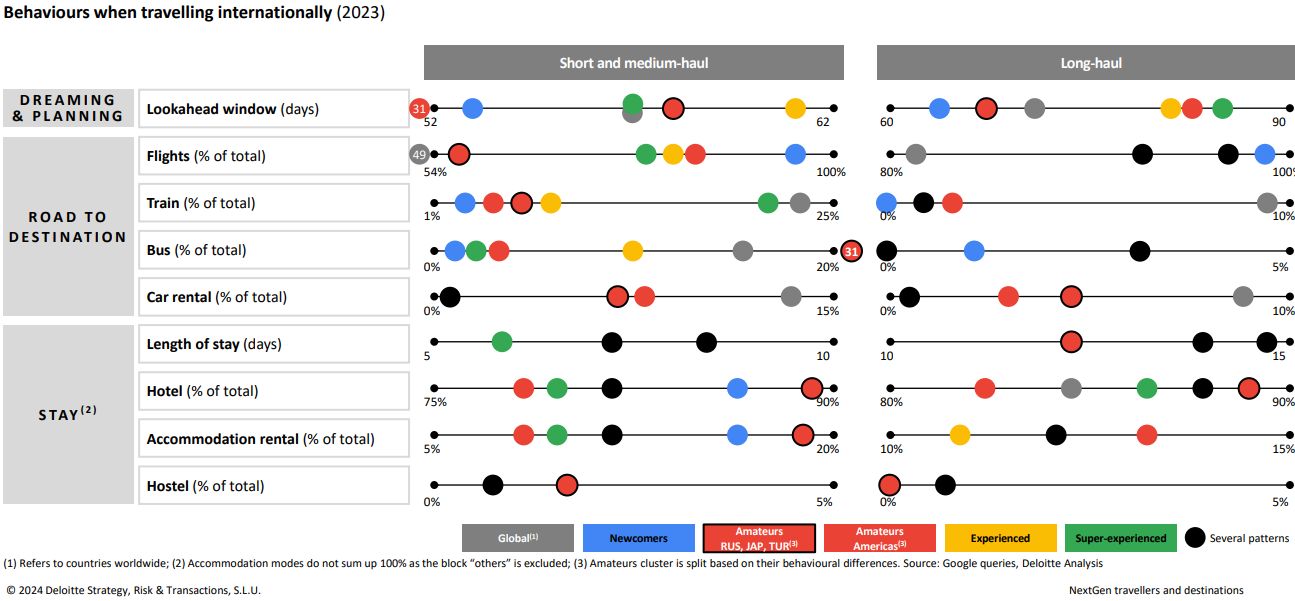
Shifting Dynamics in Global Tourism: Europe Holds Strong as APAC and South America Surge
In the past decade, European countries have remained dominant in global tourism, but growth from APAC and South America has outpaced the global average. While the top-5 destinations have stayed consistent since 2010, fragmentation is emerging, with APAC nations climbing the ranks and destinations outside the top-15 gaining a larger share of the market.
These trends are visualized in the following diagrams, which illustrate the regional shifts and changes in market distribution over time.
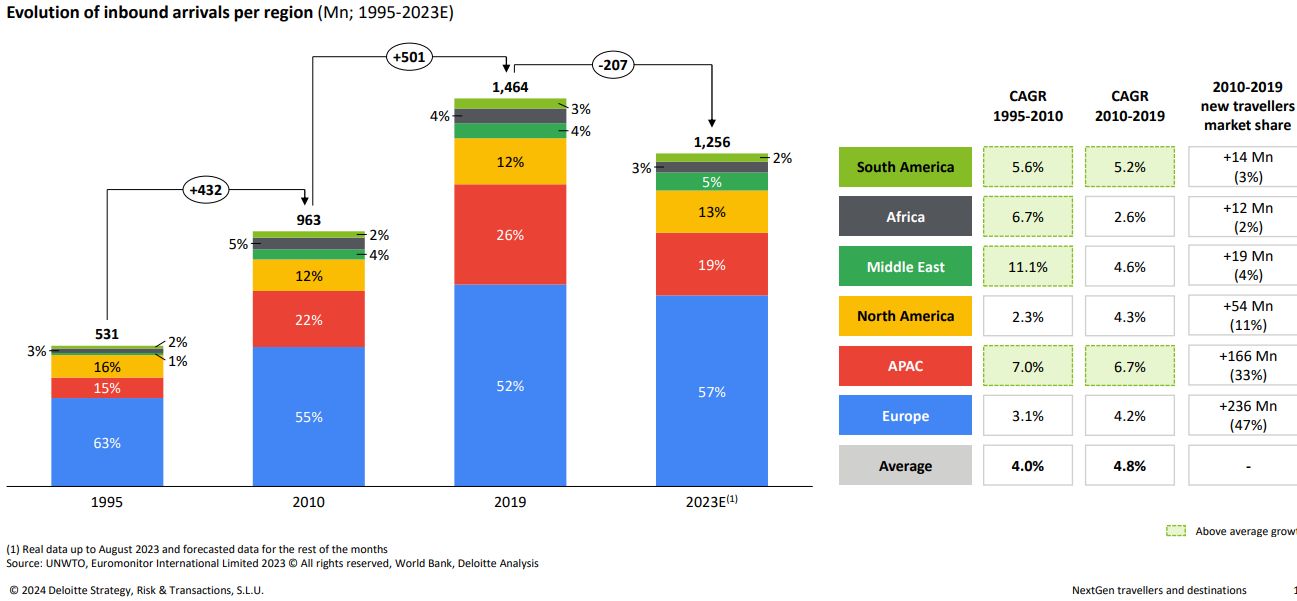
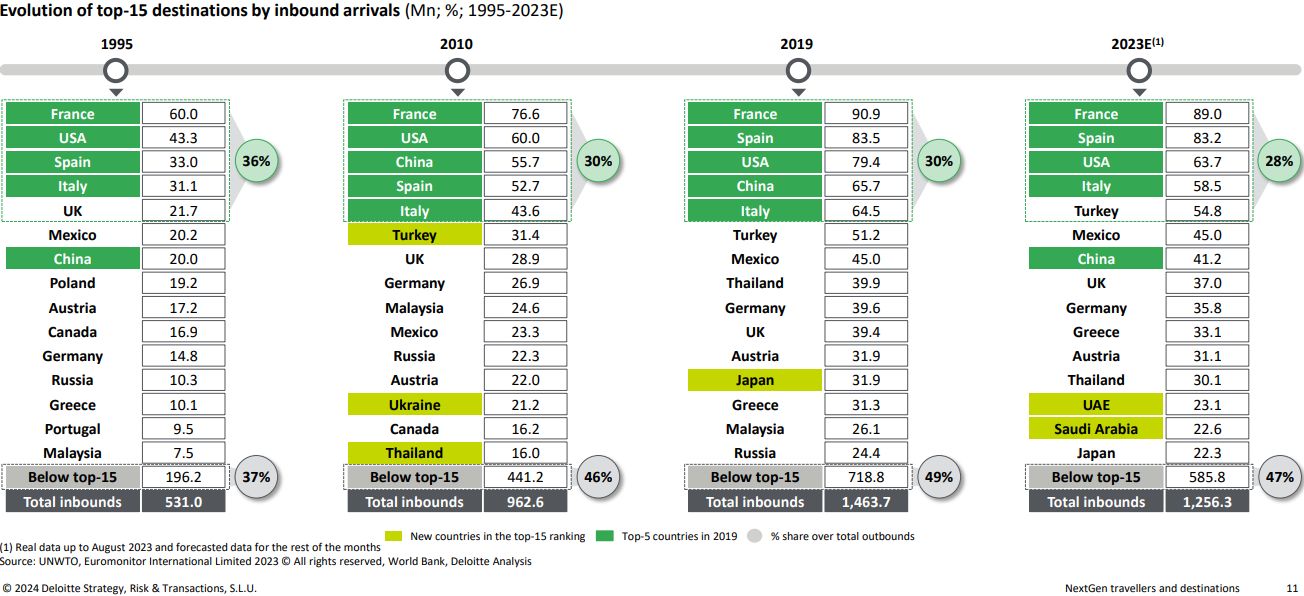
Shaping the Future
We are in the midst of an economic, social, and technological transition that will reshape the future of travel and tourism. Key trends such as demographic shifts, evolving consumer values, technological innovations, and environmental challenges will define the next era. As factors like aging populations, work transformation, virtual experiences, and sustainability concerns gain prominence, the travel industry must adapt to these dynamic influences to ensure future success. The following image highlights critical factors that will influence source markets and destinations by 2040.
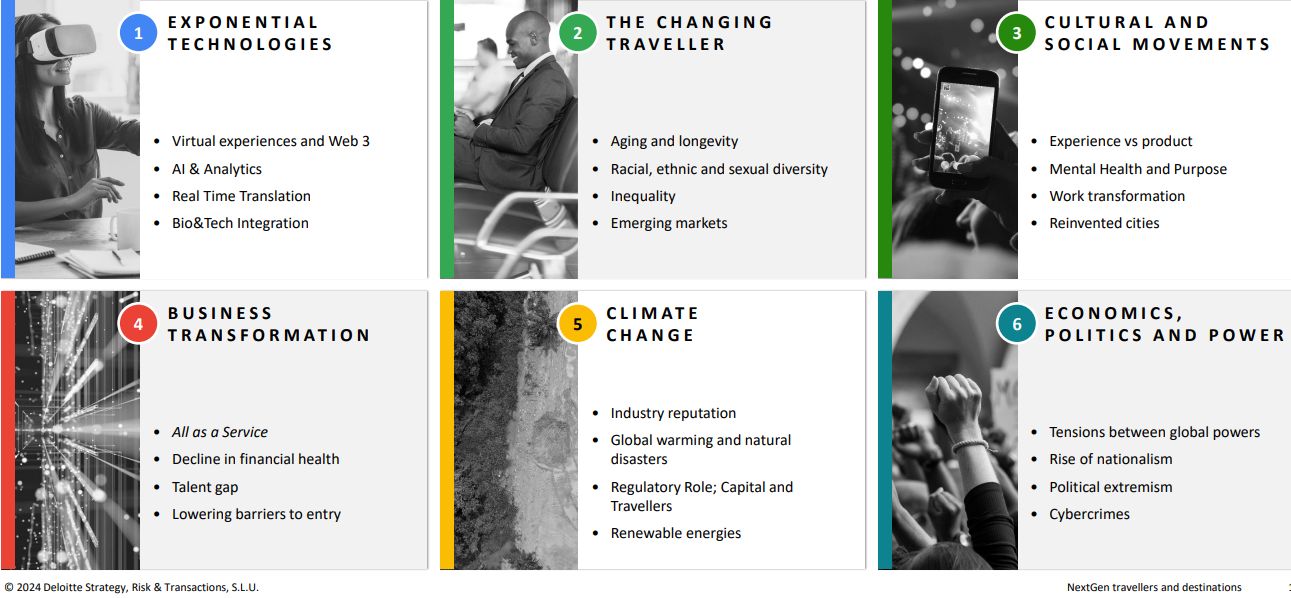
Predicting Global Travel Flows and Emerging Market Leaders
The 2040 vision for global tourism is shaped by predictive models that analyze socio-demographic, economic, and destination-specific factors. Outbound travel trends are influenced by variables such as middle-class expansion, rising income per capita, and shifts in consumer price indices. Inbound destinations are evaluated based on factors like accommodation capacity, safety, and cultural appeal. Emerging considerations, including ESG (Environmental, Social, and Governance) awareness, visa policies, and technological advancements like real-time translation tools, play a crucial role in shaping traveler preferences and destination competitiveness. However, unpredictable factors such as political instability and natural disasters are excluded from this analysis due to their high uncertainty.
Global tourism is expected to reach approximately 2.4 billion trips by 2040, a substantial increase of 936 million compared to 2019. Africa and the Americas are projected to experience the fastest outbound travel growth, while Europe and APAC will continue to dominate, contributing 75% of global departures. The top five source markets will account for 42% of the total, with new contenders like Pakistan, Brazil, and Saudi Arabia joining the top 15. Additionally, regions such as Europe, APAC, and the UAE are set to surpass 20 million outbound departures annually by 2040.
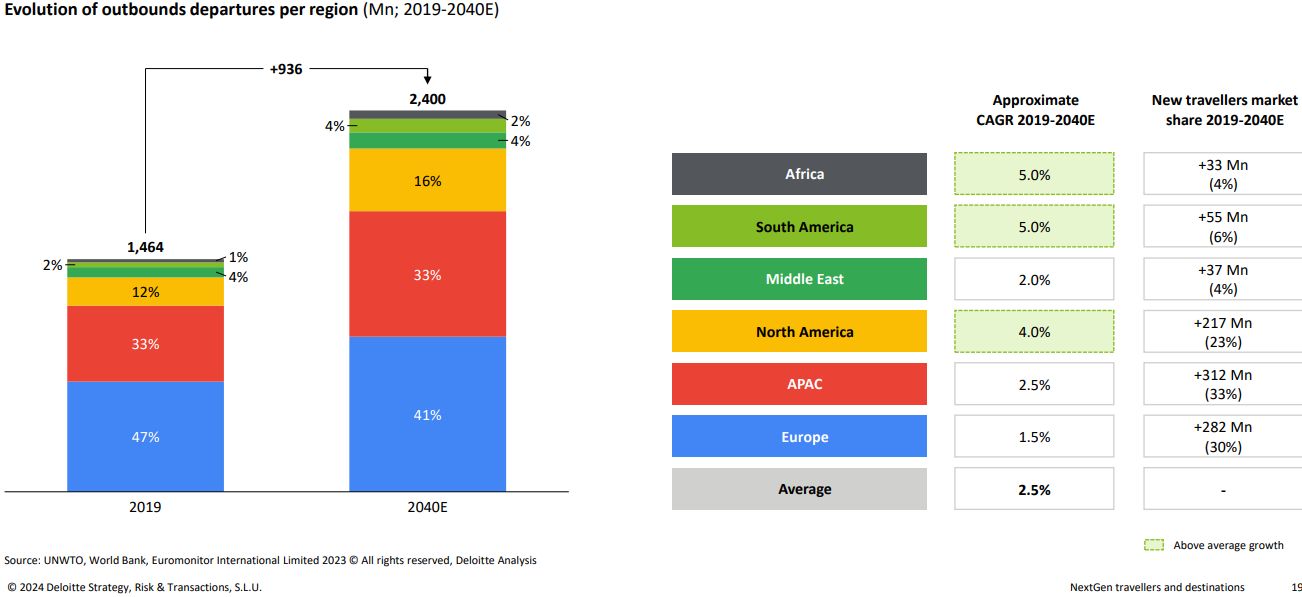
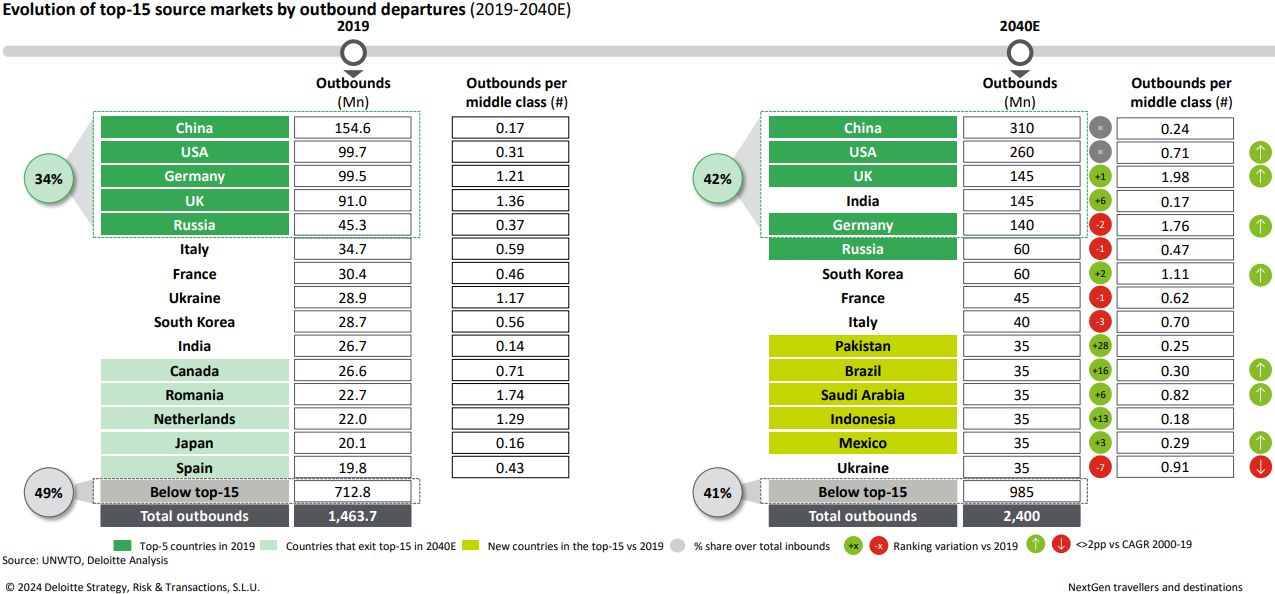
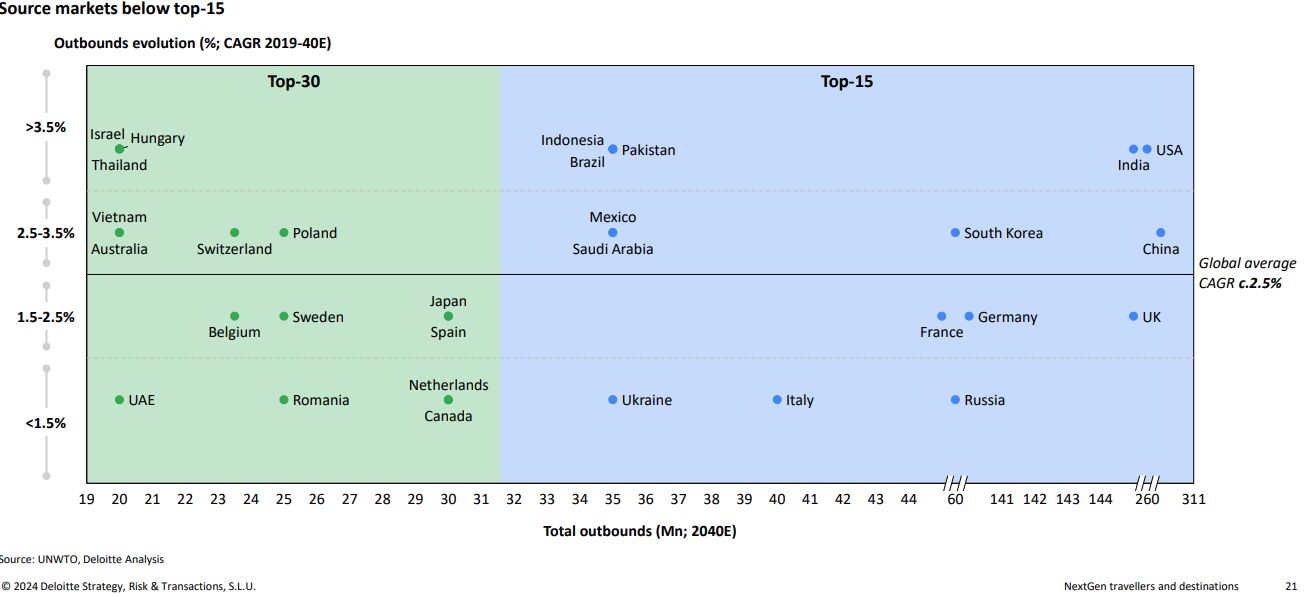
By 2040, outbound travel frequency is projected to rise significantly, with travelers categorized into four distinct segments:
- Newcomers: Emerging markets contributing 272 million trips (11% of total).
- Amateurs: Moderate growth, expected to account for 454 million trips (19%).
- Experienced Travelers: Frequent travelers projected to reach 575 million trips (24%).
- Super-Experienced: Highly seasoned travelers, contributing 476 million trips (20%).
To remain competitive, destinations must adapt to meet the evolving preferences and behaviors of these diverse traveler groups.
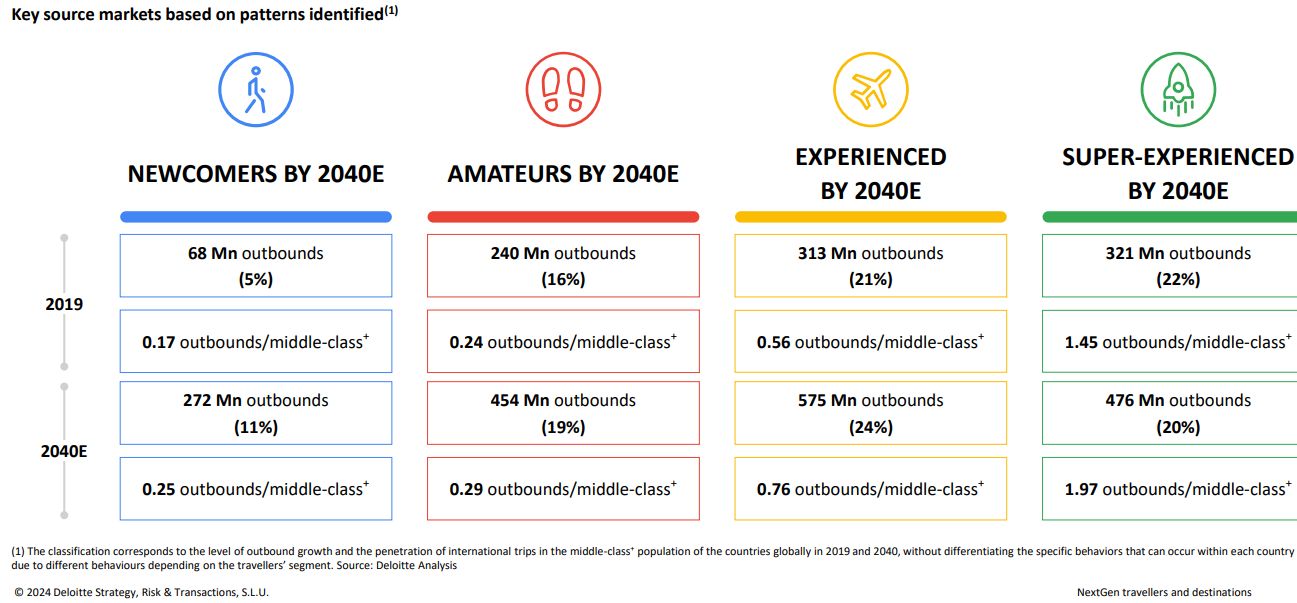
Key Destination Clusters by 2040
By 2040, 45% of global travelers are expected to concentrate in four clusters:
- Mediterranean: Unique blend of mild climate, cultural heritage, and natural beauty (e.g., Spain, Italy, Greece).
- Southeast Asia: Diversity of breathtaking landscapes and UNESCO sites (e.g., Thailand, Vietnam, Indonesia).
- Novel Middle East: Ancient civilizations meet modern innovation (e.g., Saudi Arabia, UAE, Egypt).
- Caribbean: Lush rainforests, pristine beaches, and vibrant cities (e.g., Mexico, Jamaica, Costa Rica).
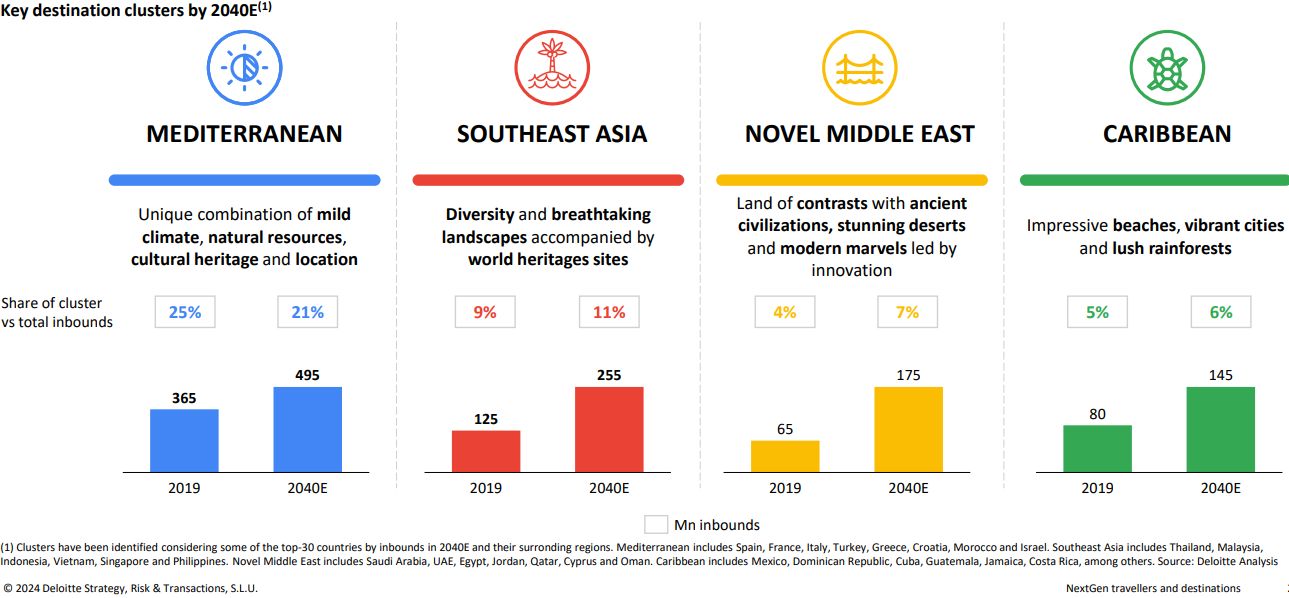
Key Trends Shaping the Future of Tourism
Travel operators need to adapt to three major trends shaping the future of tourism: the rise of new source markets, technological disruption, and growing environmental, social, and governance (ESG) requirements. By 2040, these trends will transform how travelers are engaged and destinations are managed.
- Emerging Source Markets: Travel businesses must evolve their strategies to attract travelers from rapidly growing source markets. Online channels will play a significant role, with around 60% of travel searches in emerging countries expected to be conducted online. India, for instance, is projected to see approximately 145 million international departures by 2040, highlighting the need to create culturally relevant and memorable experiences tailored to these travelers.
- Technological Disruption: Technologies such as real-time translation, virtual experiences, and Web 3 will eliminate barriers for travelers exploring new destinations. Social media and virtual platforms will enable the discovery of new locations, transforming how travelers plan and experience journeys.
- Sustainability Imperative: Tourism must adopt sustainable models that deliver economic and social benefits while addressing environmental concerns. With about 2,400 million international travelers expected in 2040, businesses will need to align with rising environmental and social awareness.
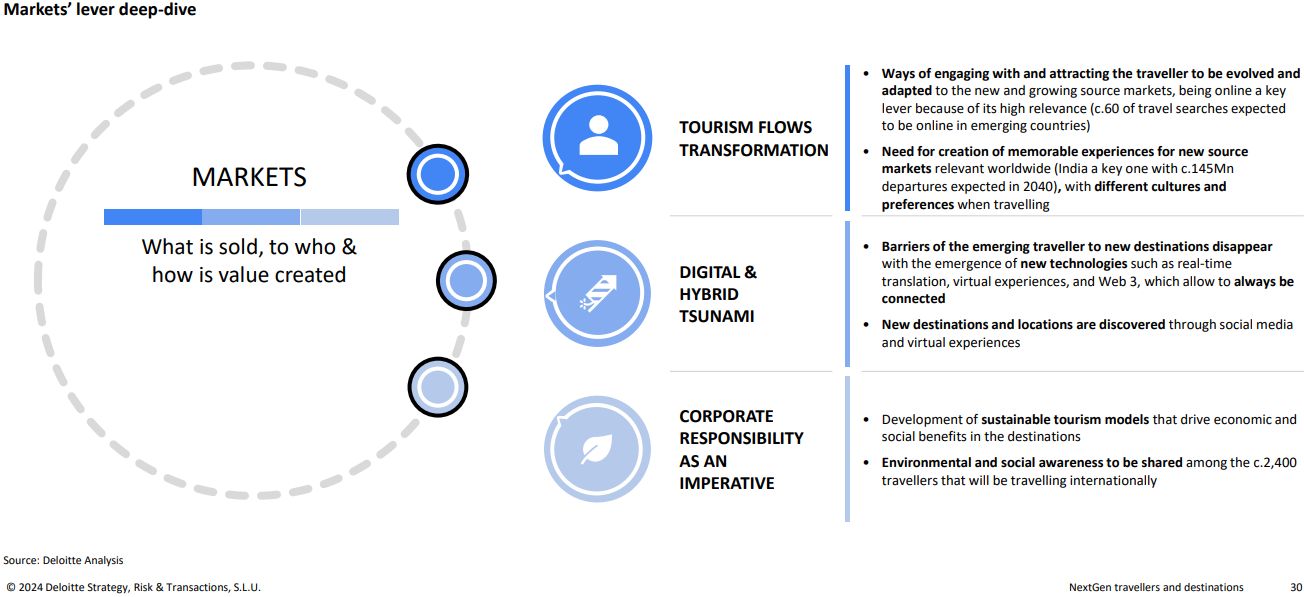
These shifts will redefine what is sold, to whom, and how value is created in the tourism industry.
The travel industry must adopt flexible business models to adapt to unexpected situations, such as health crises, which are becoming increasingly common. Destinations will continue to diversify, with regions like Southeast Asia, the Middle East, and the Caribbean gaining prominence. This diversification introduces the risk of over-concentration in certain destinations, highlighting the need for a balanced strategy that avoids over-dependence on specific origin markets.
To remain competitive, businesses should:
- Leverage and integrate AI and other technologies to gain deeper customer insights and craft personalized and memorable travel experiences.
- Forge strategic alliances to differentiate offerings and deliver exceptional value to travelers as experiences become the centerpiece of travel demand.
Flexibility, hyper-personalization, and the ability to adapt to industry reconfigurations are critical to thriving in the evolving travel landscape of 2040.
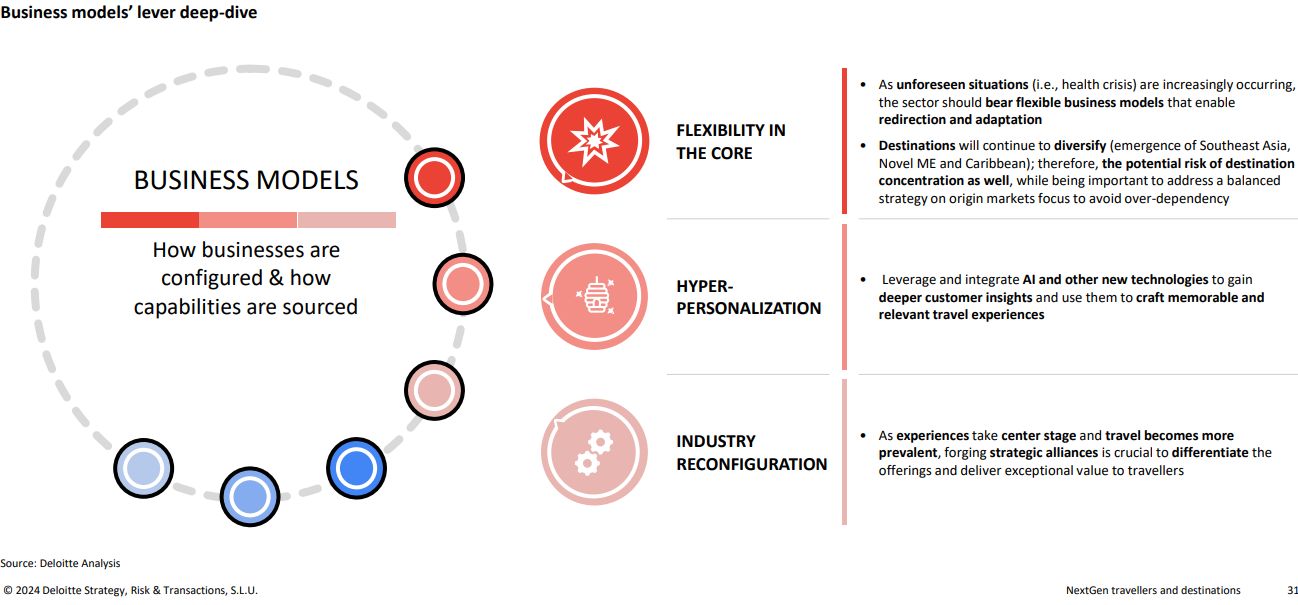
The travel industry of 2040 will require businesses to adapt to globalization, technological advancements, and evolving business models to stay competitive:
- Global Workforce Management: Managing employees across diverse regions and serving travelers from varied backgrounds will demand tailored strategies, like region-specific incentives.
- Automation and Efficiency: The complexity of travel flows makes automation essential for streamlined operations.
- Tech-Driven Optimization: Advanced tools, such as dynamic pricing based on travelers’ origin, will enhance demand and supply decisions.
- New Business Models: Subscription-based travel and experiential offerings will help counter shrinking profit margins.
These changes highlight the need to navigate the age of algorithms, global workforces, and shifting financial centers effectively.
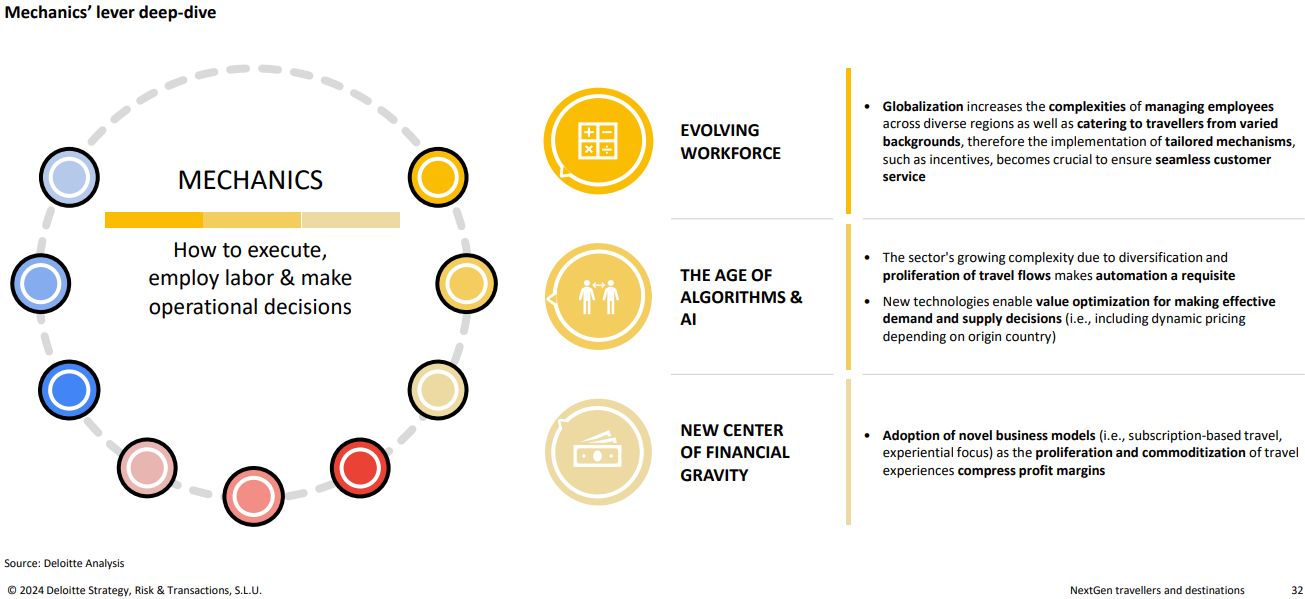
Conclusion
The "Future of Travel 2040" research presents a roadmap for an industry in transformation. The insights highlight the importance of sustainability, personalization, and technological innovation in reshaping how people explore the world. By embracing these trends, the travel industry can create a more inclusive, accessible, and exciting future for global exploration.
For more details, the full research is available on Future of travel research: https://www.thinkwithgoogle.com/intl/en-emea/consumer-insights/consumer-trends/future-of-travel-2040-insights/
Glossary
Origin of the Traveller:
- Short and Medium-Haul: Trips with an average flight time of less than 6 hours (<4,670 km).
- Long-Haul: Trips with an average flight time of 6 hours or more (≥4,670 km).
- Middle-Class+ Population: Individuals earning over $8/day, capable of saving and accessing credit, beyond basic needs.
- Source Market: The region or country where tourists originate.
- Outbound Departures: Trips by overnight residents to another destination, excluding same-day visits.
Destination of the Traveller:
- Inbound Arrivals: Non-resident overnight visitors traveling for business or leisure, excluding same-day visits.
- Destination: The region, country, or city where tourists arrive.
- Share of Search (SoS): The proportion of organic online searches a destination receives compared to total searches for all destinations.
Regional Classifications:
- South America: Includes Argentina, Brazil, Chile, Peru, and others.
- North America: Includes the USA, Canada, Mexico, and others.
- Europe: Includes the UK, France, Germany, Spain, and others.
- Middle East: Includes UAE, Saudi Arabia, Egypt, and others.
- Africa: Includes Nigeria, Morocco, South Africa, and others.
- APAC (Asia-Pacific): Includes China, India, Australia, Japan, and others.

